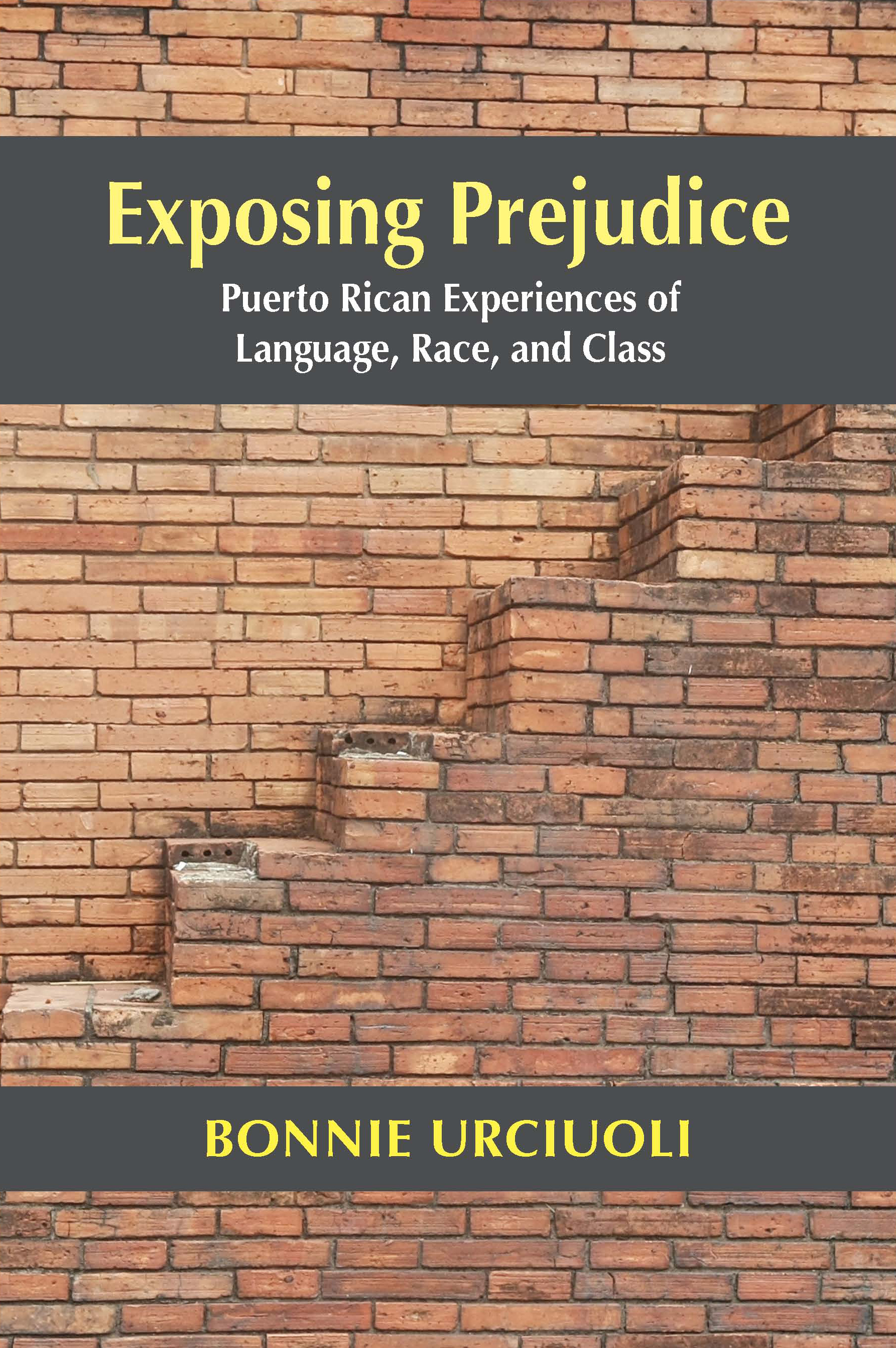“Exposing Prejudice has endured as a classic in an important and growing literature in linguistic and cultural anthropology that confronts linguistic practices of marginalization, racialization, and domination. Unlike most other works on these themes, this volume is richly ethnographic and it allows the reader to hear the voices of the very people who experience linguistic prejudice. Bonnie Urciuoli’s binocular vision of both microinteractional detail and macroeconomic forces illuminates social inequalities that are not available to those who see only one of these levels.” — Paul V. Kroskrity, University of California, Los Angeles
“Urciuoli’s book is theoretically deep, extensively documented, and analytically on target. Her views on the intersection of language, race, and class are applicable to many communities. A must read for students of linguistic prejudice.” — Ana Celia Zentella, University of California, San Diego
“[Urciuoli] builds an extensive interpretative and systematic map of language constructions from her sources in different urban contexts in terms of their class, prejudices, everyday experiences, education, and bilingualism. . . . The subjects who generate daily life are presented in the fairest manner—that is, in their complete humanity.” — American Ethnologist
“The analytical framework, which combines social theory, linguistics, and semiotics, is carefully laid out and the generous amount of linguistic data reported (with Spanish and English transcripts provided), much of which is eloquent and emotionally charged, stimulates wide-ranging discussion.” — Journal of Linguistic Anthropology
“. . . revelatory about the growing concern with the study of power in the field of linguistic anthropology . . . wonderfully reflexive not only about the politics of language but also about the politics of research, specifically of being a white woman studying working-class Puerto Rican language.” — American Anthropologist

222 pages, $28.95 list
1-4786-0712-2
978-1-4786-0712-0
© 1996
paperback
eBook availability
Exposing Prejudice
Puerto Rican Experiences of Language, Race, and Class
Urciuoli’s award-winning book explores how language and the social construction of race, class, and ethnicity shape the lives of working-class Puerto Ricans living in New York City. Her reflexive ethnographic study is a combination of two absorbing features: her analyses of language and power relations based on key principles in semiotic and linguistic anthropology, paired with the authentic voices of individuals who share their lived experiences of speaking Spanish and English.
The subjects’ conversations, interview responses, and anecdotes are saturated with ideas about what “correct” English means to them. Through these extended transcripts readers gain insight about language’s role in cultural dynamics that tangle minority populations in challenges, such as limiting where individuals and families live and work. Urciuoli’s provocative research and fieldwork give readers a rich understanding of language as the domain in which racial, ethnic, and class hierarchies are experienced.
The subjects’ conversations, interview responses, and anecdotes are saturated with ideas about what “correct” English means to them. Through these extended transcripts readers gain insight about language’s role in cultural dynamics that tangle minority populations in challenges, such as limiting where individuals and families live and work. Urciuoli’s provocative research and fieldwork give readers a rich understanding of language as the domain in which racial, ethnic, and class hierarchies are experienced.
Reactions
Introduction: The Semiotics of Exclusion
1. Racialization and Language
Racializing and Ethnicizing / Mexicans, Puerto Ricans, and Other Others / "Ethnic Success" and the Persistence of Racialization / The Conflation of Race and Class / Community as Ethnicizing Discourse / The Racialization of Language Difference / Conclusion
2. Visions of Disorder: How Puerto Ricans Became Racialized
The United States in Puerto Rico / Puerto Ricans in the United States: Living an Invisible Life / Labor and Life Structures
3. The Political Topography of Bilingualism
Walking into Boundaries / Life in the Inner Sphere / Keeping Between the Linguistic Lines in the Outer Sphere / Conclusion
4. Good English as Symbolic Capital
Mapping Voices / Metacommunicative Politics / Conclusion
5. The Race/Class/Language Map
How to Be an American / The Politics of Markedness: Acting White / Racial Teasing and Other Pernicious Ambiguities / Respect and Defense: Resisting Control / Places on the Language Map / Conclusion
1. Racialization and Language
Racializing and Ethnicizing / Mexicans, Puerto Ricans, and Other Others / "Ethnic Success" and the Persistence of Racialization / The Conflation of Race and Class / Community as Ethnicizing Discourse / The Racialization of Language Difference / Conclusion
2. Visions of Disorder: How Puerto Ricans Became Racialized
The United States in Puerto Rico / Puerto Ricans in the United States: Living an Invisible Life / Labor and Life Structures
3. The Political Topography of Bilingualism
Walking into Boundaries / Life in the Inner Sphere / Keeping Between the Linguistic Lines in the Outer Sphere / Conclusion
4. Good English as Symbolic Capital
Mapping Voices / Metacommunicative Politics / Conclusion
5. The Race/Class/Language Map
How to Be an American / The Politics of Markedness: Acting White / Racial Teasing and Other Pernicious Ambiguities / Respect and Defense: Resisting Control / Places on the Language Map / Conclusion